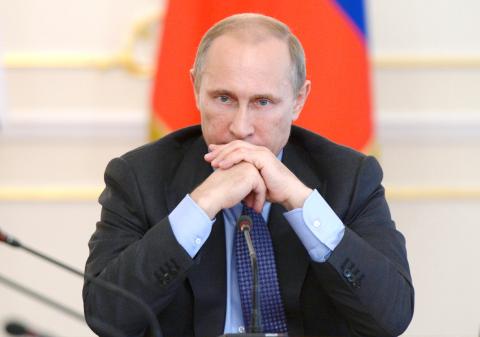A defiant Russia yesterday dismissed unprecedented Western sanctions over Ukraine after Brussels and Washington unveiled the toughest punitive measures against the Kremlin since the Cold War.
The third round of US and EU sanctions aims to force Russia to change tack and halt its support of separatists in Ukraine by targeting its vital financial, arms and energy sectors.
However, Russian Deputy Prime Minister Igor Shuvalov made light of the restrictions, also designed to hit the oligarchs in Russian President Vladimir Putin’s inner circle.

Photo: AFP
“And what about the sanctions? In for a penny, in for a pound,” he quipped to journalists.
Financial institutions put on a brave face, saying their operations would not be affected, while a top official unleashed a diatribe against the administration of US President Barack Obama.
“Obama will go down in history not as a peacemaker — everyone has already forgotten about his Nobel Peace Prize — but as a US president who started a new Cold War,” Alexei Pushkov, chairman of the foreign affairs committee at the Russian parliament’s lower house, said on Twitter.
There was no immediate official reaction from Putin’s office or the Russian Ministry of Foreign Affairs, but Moscow has long insisted sanctions would merely bring Russia’s society together and make its economy more self-reliant.
The stepped-up sanctions came as Moscow dismissed claims it was responsible for supplying the missile that downed Malaysia Airlines Flight MH17, and fighting in Ukraine showed little sign of abating.
They will notably make it tougher for Russian state-owned banks to access European financial markets, forcing their costs higher and hobbling an already struggling economy.
The Central Bank of Russia said that financial institutions were working normally and that if necessary, it would adopt measures to protect targeted lenders, which include the country’s second-largest bank, VTB.
Economists have warned that Europe’s own economy would also suffer from the so-called “sector sanctions” against its biggest source of energy and its major trading partner.
Despite the dismissive talk in Moscow, a number of economists acknowledged the new restrictions would be painful to absorb for Russia, and could stoke social tensions because its economy is sliding toward a recession.
“The current amount of corporate debt is US$700 billion; these debts should be refinanced,” FBK Strategic Analysis Institute Director Igor Nikolayev said, pointing to a lack of cheap loans in Russia.
Nikolai Petrov of the Moscow-based Higher School of Economics said that this time, the sanctions would be felt by everyday Russians — and predicted they would drive an even greater wedge between Putin and the West.
“The confrontation will increase abruptly. Putin has been practically driven into a corner and this man does not make concessions under pressure,” he said.

Taiwan is projected to lose a working-age population of about 6.67 million people in two waves of retirement in the coming years, as the nation confronts accelerating demographic decline and a shortage of younger workers to take their place, the Ministry of the Interior said. Taiwan experienced its largest baby boom between 1958 and 1966, when the population grew by 3.78 million, followed by a second surge of 2.89 million between 1976 and 1982, ministry data showed. In 2023, the first of those baby boom generations — those born in the late 1950s and early 1960s — began to enter retirement, triggering

One of two tropical depressions that formed off Taiwan yesterday morning could turn into a moderate typhoon by the weekend, the Central Weather Administration (CWA) said yesterday. Tropical Depression No. 21 formed at 8am about 1,850km off the southeast coast, CWA forecaster Lee Meng-hsuan (李孟軒) said. The weather system is expected to move northwest as it builds momentum, possibly intensifying this weekend into a typhoon, which would be called Mitag, Lee said. The radius of the storm is expected to reach almost 200km, she said. It is forecast to approach the southeast of Taiwan on Monday next week and pass through the Bashi Channel

NO CHANGE: The TRA makes clear that the US does not consider the status of Taiwan to have been determined by WWII-era documents, a former AIT deputy director said The American Institute in Taiwan’s (AIT) comments that World War-II era documents do not determine Taiwan’s political status accurately conveyed the US’ stance, the US Department of State said. An AIT spokesperson on Saturday said that a Chinese official mischaracterized World War II-era documents as stating that Taiwan was ceded to the China. The remarks from the US’ de facto embassy in Taiwan drew criticism from the Ma Ying-jeou Foundation, whose director said the comments put Taiwan in danger. The Chinese-language United Daily News yesterday reported that a US State Department spokesperson confirmed the AIT’s position. They added that the US would continue to

The number of Chinese spouses applying for dependent residency as well as long-term residency in Taiwan has decreased, the Mainland Affairs Council said yesterday, adding that the reduction of Chinese spouses staying or living in Taiwan is only one facet reflecting the general decrease in the number of people willing to get married in Taiwan. The number of Chinese spouses applying for dependent residency last year was 7,123, down by 2,931, or 29.15 percent, from the previous year. The same census showed that the number of Chinese spouses applying for long-term residency and receiving approval last year stood at 2,973, down 1,520,